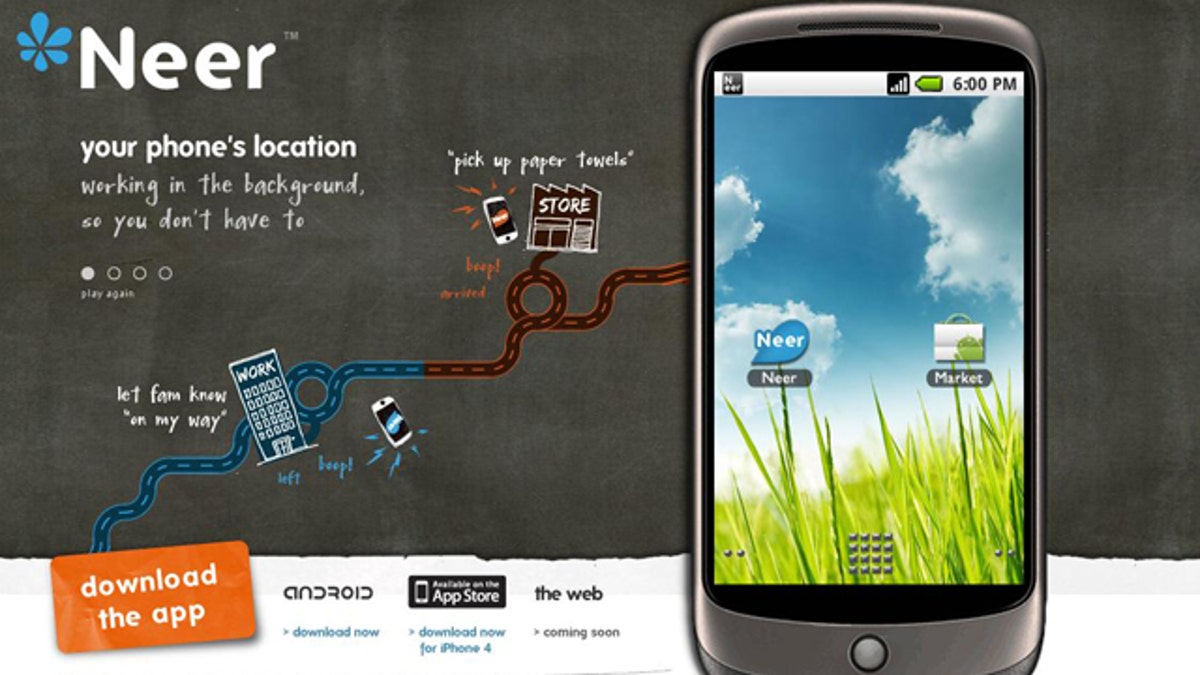
A screenshot of the website for location-aware app Neer, which cuts the creep factor from such programs and proves surprisingly useful. (Neer)
The biggest tech boogieman today has to be location-based services, a.k.a. please-rob-me apps. But are they all really as creepy as they seem?
Location-based services were supposed to tailor online information to your specific needs, with obvious benefits. It's a good thing that Google Maps knows where you are when you open the navigation software on your smartphone -- especially if you're lost. So is getting a local forecast when you search for "weather." It might be a good thing if your phone could alert you to a sale at a retailer as you walked past -- though most of us would opt out of such a convenience.
The real creep factor came through social networking, however. Instead of just letting advertisers, marketers and search software know where you are, location-aware apps endeavored to alert all of your friends to your exact location.
Foursquare, which started in 2009, is the primary proponent of such software, letting you earn badges whenever you check in at a particular location. Check in often enough and you could get a discount on your latte -- or win the game: "JQ is now the mayor of Tim Horton's doughnuts on Lexington Avenue." It sounds like fun, but it can also bring stalking to a whole new level.
How far this could go was recently demonstrated by a new app called Color. It created a stir -- and received a reported $41 million in investments -- by allowing users to share all their phone's photos with anyone nearby. Anyone. Photos of your kids, your girlfriend, your last vacation, everything.
One has to wonder what sort of photos might pop up on your screen from total strangers sitting across from you in the coffee shop. It could take exhibitionism to a whole new virtual realm.
The conventional wisdom states these apps may be fine for 20-somethings, but the rest of us are too wary and too covetous of our privacy. The folks who use these apps aren't oblivious to the dangers, however -- many use fake home addresses, for example. Furthermore, when used in a more targeted or restricted way, location-based services can be extremely useful.
Tracking your kids on their cell phones used to be something only over-protective parents did, for example. But it's quickly becoming the norm for anyone concerned about a new teenage driver or junior's grades (is he at the library studying or at the soda shop?). For many, the value of such software outweighs the creep factor -- assuming the kids know they're being tracked.
There are also location-aware apps that hope to overcome the sinister connotations by limiting the information you share -- and with whom you share it (sorry, Color). Neer is one such example.
The free Android and iPhone app with the oddly spelled name was developed by cell phone chip giant Qualcomm under its Services Labs division. In a nutshell, Neer is a location-based app for grown-ups. It's designed to be used by a couple or family -- and only by that couple or family. "Friends" need not apply.
You and your spouse install Neer and enter key places you typically visit or think are important (workplace, neighborhood grocery store etc.), then you let the app inform the other person of your location. Currently, it's primary utility is in making it easier for others to reach you: Don't bother calling the wife at work, she's on the train, so call her cell phone instead. It can also be reassuring for families: Whew, she remembered that I can't pick up our son today because I can see she's at the school.
Neer's director of business development, Ian Heidt, likes to call it "context sharing." Not every location is shared, and you only share select locations with select people. Expanding on the idea, Neer has added location aware to-do lists so that when you're in Safeway, it will remind you to pick up a dozen eggs -- soon you'll be able to share them, to let your better-half know that you've picked up the groceries so she can go straight home.
So far, Neer is small, garnering roughly 40,000 downloads. Compare that to Foursquare, which has 6.5 million users worldwide, according to the company. But there's plenty of potential for such narrowly focused location-aware apps that more closely mimic things we already do in real life.
How far it will go is still anyone's guess. Just as relationships can be difficult to negotiate and navigate, so can this new world of non-creepy location-based social networking.
As Heidt put it, "adult-to-adult sharing is still evolving." No kidding.
Follow John R. Quain on Twitter @jqontech or find more tech coverage at J-Q.com.








































